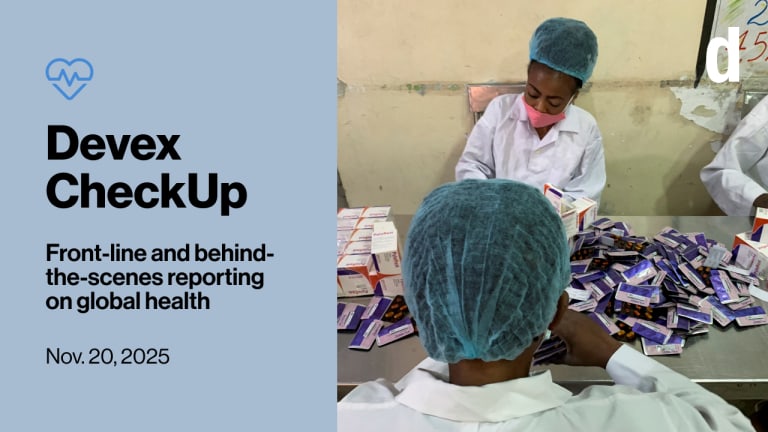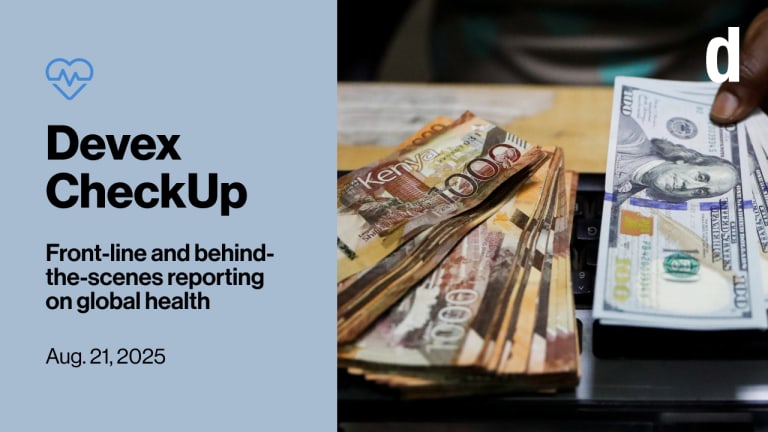
Greetings from Berlin, where this year’s World Health Summit wrapped up on Tuesday. The three-day conference was capped by an investment event for the World Health Organization that brought out Bill Gates, WHO Director-General Tedros Adhanom Ghebreyesus, German Chancellor Olaf Scholz, and an a cappella group.
Only one of them made a donation, but it was a big one: Scholz pledged at least $260 million in voluntary funding to WHO, part of nearly $700 million in new pledges that arrived Monday night.
This is a preview of Devex CheckUp
Sign up to this weekly newsletter for exclusive global health news and insider insights in your inbox every Thursday.
There was, however, some confusion as countries and companies announced pledges without clarifying if they were new funds directed toward the investment round, money that had already been announced, or something else entirely. Representatives from France, Spain, and the United Kingdom appeared only to promise that they would announce their contributions at some point in the future.
WHO ultimately clarified that it has received more than $1 billion of the $7.1 billion in donations it aims to secure in its first investment round. That leaves it with some way to go, though several more funding events are scheduled. These initiatives are guided by WHO’s desire for flexible, guaranteed funds to pay for a four-year strategic plan that starts next year, freeing the agency from the shackles of unpredictable, project-specific funding.
Money was the theme of this year’s WHS. More specifically, the main discussion was the slide in global health funding at a moment when so many multilaterals and funds are on the hunt for support. Gavi, the Vaccine Alliance, the Global Fund to Fight AIDS, Tuberculosis and Malaria, the International Development Association, and the Pandemic Fund have all launched or are about to launch replenishment rounds.
Gavi and the Global Fund used their time on the stage at WHS to make their case for renewed financing. And while donors were receptive to their success stories and promises of renewed efficiency, they still cautioned that donor funds would be tight.
“Look at the health sector, look at the current needs for humanitarian aid and the ongoing conflict in the world. Look at the need for climate financing,” Niels Annen, the parliamentary state secretary for Germany’s Ministry of Economic Cooperation and Development, said at one point. “If you put everything together, it’s impossible to address all these challenges with government money.”
Read: WHO raises nearly $700 million, but global health funding worries persist
Opinion: How the world funds global health is starting to look outdated
A broader agenda
WHO pledges weren’t the only big announcements to come out of WHS.
The Pasteur Network launched a three-year project to boost research at the intersection of climate change and health. The project, which received a $5 million investment from the Institute of Philanthropy and The Rockefeller Foundation, will create a fellowship for climate-health technical experts. It will also help build out three exemplar sites — in Brazil, Senegal, and Vietnam — to help guide regional-specific initiatives.
“It’s not disease-specific because climate change considerations are different in the different regions,” Estelle Willie, the director of health policy and communications at Rockefeller, tells Devex. Each hub will “determine what you think and consider is a climate threat and risk and develop the metrics, the measurements, evaluations to see what the impact is.”
The United Nations Population Fund also introduced its first WomenX Collective hub in Berlin. The WomenX Collective initiative seeks to raise $100 million in catalytic funding to develop a network of centers that specialize in women’s health, particularly sexual and reproductive health and rights. A second hub in Nairobi is set to launch next year.
Background reading: What’s next for the climate and health agenda?
If you build it, they will come
This year’s WHS also brought news that the regional production of vaccines, drugs, and health products is inching closer to reality. In fact, at least three facilities in Africa may be manufacturing vaccines at scale within five years.
This, of course, is in response to the COVID-19 pandemic when the global south was pushed to the back of the line in accessing vaccines and other therapeutics. The idea is that greater manufacturing capacity is critical to ensuring greater equity.
But the introduction of these new facilities brings its own challenges, including how to ensure they are sustainable and still functioning the next time a pandemic arrives.
Already, the Africa Centres for Disease Control and Prevention and other organizations are pressing governments on the continent to ensure they prioritize regionally developed products so those manufacturers can afford to keep the lights on.
Read: Regional vaccine and drug production is coming. Can it survive?
Locked and loaded
All those organizations wrapped up in fundraising at the moment might want to keep an eye on the Transform Health Fund. The new pan-African blended finance investment vehicle reached a final investment close at $111 million, exceeding its target by $11 million.
The fund did so by tapping a range of investors, from development finance institutions to corporations, impact investors, and donor-advised funds. Now the fund will use that money to invest in high-impact endeavors to offer private health care solutions across the African continent, with a focus on underserved populations. Off to a quick start, the fund has already invested in three businesses.
AfricInvest manages the fund. It’s the first time the experienced African impact investor has managed a dedicated health fund. The other partner is the Health Finance Coalition.
The idea that drove the development of the fund is that health care, even for some of the most vulnerable populations, is investable. And while its architects acknowledge that investing in health care does come with some risk, they are working to mitigate that risk, and say it’s important to pursue alternative health care funding models beyond governments and donors.
Read: Pan-African Transform Health Fund surpassed goal, raised $111 million (Pro)
+ Not yet a Devex Pro member? Start your 15-day free trial today to access all our expert analyses, insider insights, funding data, exclusive events, and more. Check out all the exclusive content available to you.
Under the skin
Is your microbiome to blame for your illness?
Researchers in Cape Town, South Africa, are working to accelerate microbiome research in Africa — studying the trillions of microorganisms that live in and on the human body. The diversity of microbiomes in Africa is significantly underrepresented in global databases. These researchers will be following compelling evidence that shows disruptions in the balance of bacteria may actually increase a person’s risk of contracting diseases.
The new Microbial Interactions Laboratory is bringing together seven research teams for this first-of-its-kind effort. A major focus area will be female reproductive health. That includes considering how disruptions in the vaginal microbiome can lead to bacterial vaginosis, which drives genital inflammation, increases the risk of contracting HIV, and affects fertility and birth outcomes.
Their goal is to help foster the development of microbiome-centered health solutions for the continent, including diagnostics and treatments.
“It's shifting the dynamic to make much more data available that is locally led,” says Jo-Ann Passmore, lead of the Vaginal Microbiome Research Consortium for Africa.
Read: New laboratory aims to expand microbiome research in Africa
What we’re reading
In interviews with 65 health care workers in Gaza, 44 reported seeing preteen children shot in the head or chest during the Israeli invasion. [The New York Times]
A specialized artificial intelligence software has helped researchers identify 160,000 previously unknown RNA viruses. [Deutsche Welle]
WHO has advised against travel and trade restrictions on Rwanda due to the Marburg outbreak. But two major conferences, including the Scaling Up Nutrition Movement Global Gathering, have been canceled or postponed. [WHO]








